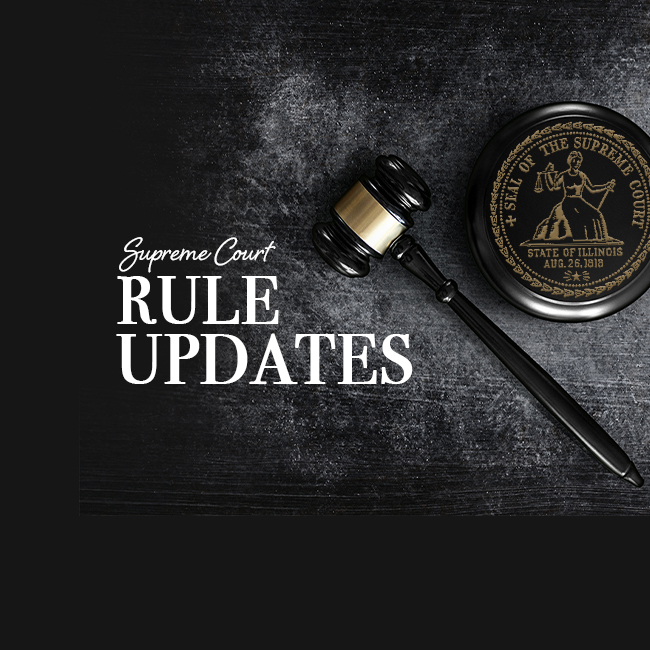Illinois Supreme Court Amends Rule 23 to Allow Citation of Unpublished Appellate Court Rulings

Chief Justice Anne M. Burke and the Illinois Supreme Court announced today the amendment of Rule 23, which will allow litigants to cite unpublished opinions from the Illinois Appellate Courts for persuasive purposes. Amended Rule 23 is effective Jan. 1, 2021.
The Illinois Supreme Court Rules including Amended Rule 23 can be found on the court's website.
“Changes to Rule 23 have been discussed and studied for a long time,” Chief Justice Anne M. Burke said. “This amendment is a welcome change and will improve the administration of justice in Illinois.”
Under Rule 23 as previously constituted, litigants could cite rulings from other jurisdictions as persuasive authority but were not able to cite unpublished Illinois Appellate Court rulings. This led to a confusing situation where an Illinois trial court ruling could be cited without running afoul of the rule, but an unpublished appellate order affirming that very same trial ruling could not be cited.
Previously, Rule 23 was considered necessary at a time when the majority of legal research was done using books. As described by the late Chief Justice Michael A. Bilandic in 1994, there was “an avalanche of opinions” from Appellate Courts at the time and many were simply “too long.” But with today’s text-searchable electronic legal research databases this is no longer a significant concern.
The amendment to Rule 23 was recommended by the Supreme Court Rules Committee, after a public hearing on June 24, 2020 generated numerous written comments and testimony from organizations and practitioners. The commentary received overwhelmingly supported allowing citation to unpublished opinions for persuasive authority.
“It is a very welcomed development for both bench and bar,” said Attorney J. Timothy Eaton, who served as Co-Chair of a Special Committee on Supreme Court Rule 23 comprised of appointees from the Chicago Bar Association, Illinois State Bar Association, Appellate Lawyers’ Association, and the Executive Committee of the Illinois Judges Association. The Special Committee submitted written comments and testimony in support of amending Rule 23 to allow citation to unpublished opinions for persuasive authority.
The ISBA Civil Practice and Procedure Section applauds the Court for amending Rule 23. Through its biannual Allerton House Conference, the Civil Practice and Procedure Section has spent significant time discussing and exploring options for amending the Rule.


Member Comments (12)
This is welcome news.
I do share, however, Justice Bilandic’s view that many opinions are too long. Practitioners are most interested in the application of the facts to the law, not a disposition of all the facts only some of which are relevant to the legal issues on appeal. Justice Mills wrote in a concise and meaningful way that I hope becomes a model.
Stay safe and Happy Thanksgiving!
a very welcomed development !
A welcome improvement. Too many times, my firm would invest the time and effort inot a pro bono appeal (because there was an issue that we wanted resolved). We would spend a great amount of time (and money) only to see our ruling issued as a Rule 23.
Or clients who would send us opinons that they felt were helpful to their case, and when we would explain that these were literally worthless to their cause they would react with totla confusion.
So why do we have a Rule 23 anymore?
The amendment doesn’t change the current restriction prohibiting the citing of appellate opinions for precedential, i.e., dispositive, value (with enumerated exceptions). The amendment merely allows appellate opinions to be cited for persuasive value. When Rule 23 is rescinded is when it will become interesting.
Thanks but isn’t that a difference without a distinction?
No. Before the amendment, you couldn’t cite a Rule 23 opinion even for persuasive value. Now you can, so there is a difference. Whether that’s a significant difference, practically speaking, is a different question. . .
The amended rule only applies to Rule 23 opinions entered on or after January 1, 2021. Parties are still prohibited from citing Rule 23 opinions entered prior to January 1, 2021. This was not made clear in this article but it’s clear from the language of the amended rule.
"(1) An order entered under subpart (b) or (c) of this rule is not precedential and may not be cited by any party except to support contentions of double jeopardy, res judicata, collateral estoppel, or law of the case. However, a nonprecedential order entered under subpart (b) of this rule on or after January 1, 2021, may be cited for persuasive purposes."
Rule 23(e)(1)
It is very welcome change. I for one had a case decided by a Rule 23 order that repaeated what I had stated in my brief: this is a matter of first impression as no published opinion has addressed the issue. when it was issued as a rule 23 order I filed a petition seeking to have it published. It was denied. I had several attorneys call me seeking to have it published. All were dissapointed to hear I had already sought publication and it was denied.
.
Another needed rule change would be to allow non-parties to file motions to publish. After all it is a non-party that has the greatest need for publication.
I was the person who requested the change. I am disappoint that the Rule 23 was not eliminate or require a Appealate Court to explain why the Court has decided to render its opinion a Rule 23 opinion. As I pointed out in my presentation to the Rules Committee their is a section of Rule 23 that is never used it appears to be merely verbiage that has never been use.
the isba has been pushing repeal for decades. some of us remember that. this is a crucial first step because it is a first step.
as i tell my divorce clients, an elephant is eaten one bite at a time. this is just the first bite.